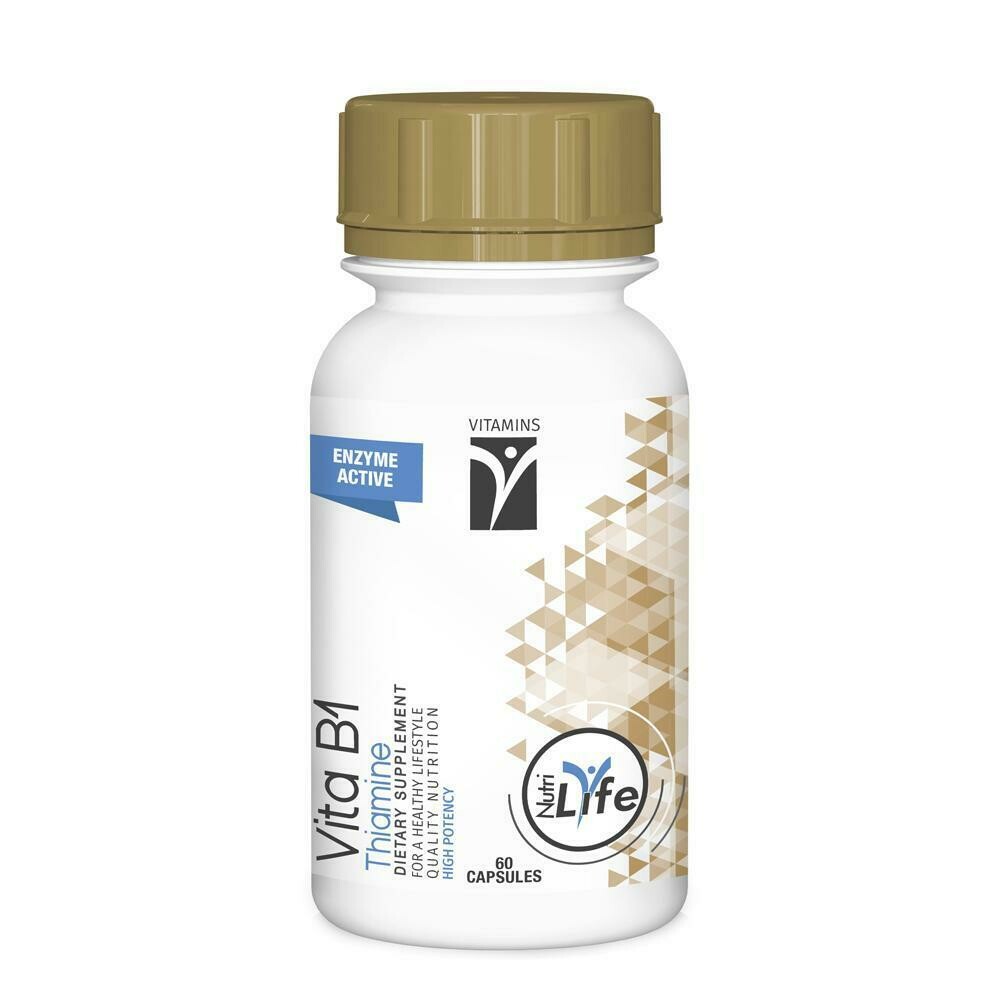
Nutrilife Vitamin B1 Thiamine 60s
Why is thiamine good for you? Below are the major benefits of vitamin B1/thiamine:
1. Maintains a Healthy Metabolism
Thiamine is needed to make ATP, the body’s main energy-carrying molecule, within the mitochondria of cells. It helps in the conversion of carbohydrates into glucose, which is the preferred source of energy that the body runs off of to keep your metabolism running smoothly. Thiamine also helps break down proteins and fats too. (4)
We know that the coenzymatic form of thiamine is involved in two main types of metabolic reactions within the body: decarboxylation and transketolation. After eating something containing thiamine, it is transported in the blood and plasma and then used by the cells to convert energy.
Thiamine also plays an important role in the production of red blood cells, which are used for ongoing energy. Because thiamine and other B vitamins are naturally energy-boosting and required to produce ATD from foods, you will often find B vitamin complex supplements labeled as “energy boosting” or “healthy metabolism” products. Ingesting thiamine in supplement form is also sometimes given to patients to help correct metabolic disorders associated with genetic diseases.
2. Prevents Nerve Damage
Without enough “fuel” from our diets going toward the function of our nervous system, we can experience nerve damage that can result in trouble moving, learning and remembering information. Thiamine is needed to convert carbohydrates from our food, and the main role of carbohydrates is to provide energy for the body, especially for the brain and nervous system. Thiamine is specifically needed for a system of enzyme reactions called pyruvate dehydrogenase, which works to oxidize sugars that we eat. (5)
Thiamine also helps with proper development of myelin sheaths, which wrap around nerves to protect them from damage and death.
3. Supports a Healthy Cardiovascular System
Having enough thiamine in the body is essential for producing the neurotransmitter called acetylcholine. This is used to relay messages between the nerves and the muscles, our heart being one of the main muscles that relies on these crucial signals.
In order to maintain proper cardiac function and healthy heartbeat rhythms, the nerves and muscles must be able to use bodily energy to keep signaling to each other. Recent studies have shown that thiamine can be useful in fighting heart disease because it helps maintain healthy ventricular function and treat heart failure. (6)
4. Boosts Immunity
Thiamine helps maintain the muscle tone along the walls of the digestive tract, where much of the immune system is actually located. Digestive health is important for thiamine absorption because a healthy digestive tract allows your body to extract nutrients from food better, which are used to boost immunity and defend you from becoming sick. Thiamine helps in the secretion of hydrochloric acid, which is essential for the complete digestion of food particles and absorption of nutrients. (7)
5. Helps Treat Alcoholism
Thiamine helps decrease the risk for developing the specific brain disorder called Wernicke-Korsakoff syndrome (WKS). WKS symptoms include involuntary muscle movement, nerve damage, lethargy and trouble walking. This brain disorder is related to low levels of thiamine and is often seen in alcoholics, especially those who have poor diets as well. (8) Alcohol negatively impacts the body’s ability to absorb thiamine from foods.
It is believed that between 30 percent to 80 percent of alcoholics have thiamine deficiency. High doses of thiamine have been shown to help to decrease symptoms of alcohol withdrawal.
6. Prevents Brain Disorders
Thiamine helps bridge the gap between the brain/body connection. It can help defend against a type of brain damage called cerebellar syndrome. Health care providers also sometimes give high doses of thiamine to patients to prevent certain memory disorders that are commonly seen in thiamine-deficient people, including those experiencing alcohol withdrawal or coming out of a coma. (9) It is also linked with decreasing the risk of Alzheimer’s disease. (10)
7. Enhances Learning
Thiamine is a crucial vitamin for increasing focus, energy, fighting chronic stress and possibly preventing memory loss. Studies have linked thiamine deficiency to problems learning and retaining information. One study out of the U.K. showed that thiamine caused quick reaction times and feelings of clear-headedness in those taking tests. (11)
8. Helps Keep a Positive Mood
Thiamine improves the body’s ability to withstand stress, which is one reason why B vitamins are often called the “anti-stress” vitamins. A lack of energy can contribute to a poor mood and motivation. Thiamine is needed to boost your mood and defend against depression and anxiety because of its positive effects on the brain. (12)
It can ward off inflammation and help maintain healthy brain function that is responsible for decision making in the brain. Healthy nerve function is crucial for controlling stress and anxiety and boosting your mood.
9. Helps Prevent Vision Problems
Some research has shown that thiamine can help to defend against vision problems, such as cataracts and glaucoma. This is due to its ability to influence nerve and muscle signaling, which is important in relaying information from the eyes to the brain. (13)

